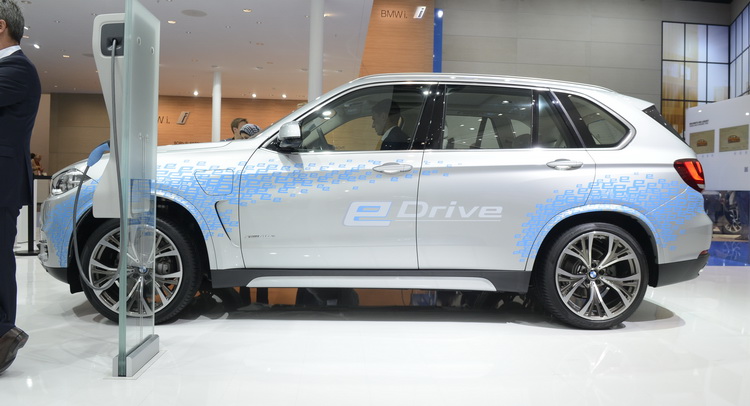Since BMW‘s X5 xDrive40e plug-in hybrid has already been heavily covered by the media these past couple of months, it’s time to write down some numbers and see how it stacks up against its direct rivals.
With the world going one way, it was always important for SUV manufacturers to make sure they didn’t fall behind in terms of technology, efficiency and performance. We’re all headed towards an all-electric future, and even those who seem to resist the notion, probably know that it’s bound to happen some day.
Premium full-size SUVs are currently hybrids, not all-electric, which is fine for now, especially since we get to compare different philosophies and performance figures, fuel consumption, dry weight and so on.
The BMW X5 has always been, well, the very tip of the spear in terms of where it was positioned as both a sporty and an efficient SUV. Don’t forget, these BMW folks have always been high on the word “efficient”, so falling behind the competition now, would be somewhat embarrassing.
But let’s meet the group and draw some conclusions based on statistics:
BMW X5 xDrive40e – 313 PS, 0-100 km/h in 6.8 sec, 3.3 liters/100 km avg
Audi Q7 e-tron 3.0 TDI – 374 PS, 0-100 km/h in 6.0 sec, 1.7liters/100 km avg
Volvo XC90 T8 Twin Engine – 408 PS, 0-100 km/h in 5.6 sec, 2.1 liters/100 km avg
Mercedes-Benz GLE 500 e – 442 PS, 0-100 km/h in 5.3 sec, 3.3 liters/100 km avg
Porsche Cayenne S E-Hybrid – 416 PS, 0-100 km/h in 5.9 sec, 3.4 liters/100 km avg
Range Rover Sport SDV6 Hybrid – 340 PS, 0-100 km/h in 6.7 sec, 6.2 liters/100 km avg
Lexus RX 450 h – 300 PS, 0-100 km/h in 7.4 sec, 8.1 liters/100 km avg
Pretty interesting, isn’t it? It turns out that the X5’s 3.3 l/100 km (71 mpg US/85 mpg UK) average fuel consumption is…actually average itself, compared to how good the Q7 and the XC90 look on paper. The Audi is by far the most fuel efficient SUV here, with its 1.7l/100 km (138 mpg US/166 mpg UK) average.
Sure, good luck getting anywhere close to those numbers in the real world, but for some people specs do matter a lot. We buy most of our smartphones based on who’s got the best specs, even though we rarely use all that processing power – the same mentality can be used to analyze rival cars.
One thing that stands in favor of the BMW X5 xDrive40e is the fact that it has a very impressive fuel tank capacity at 85 liters (22.4 gal).



































